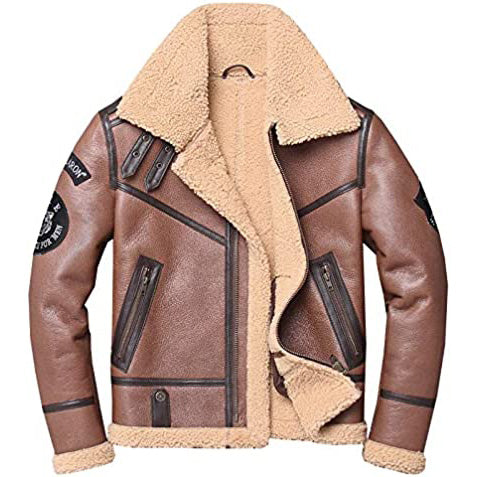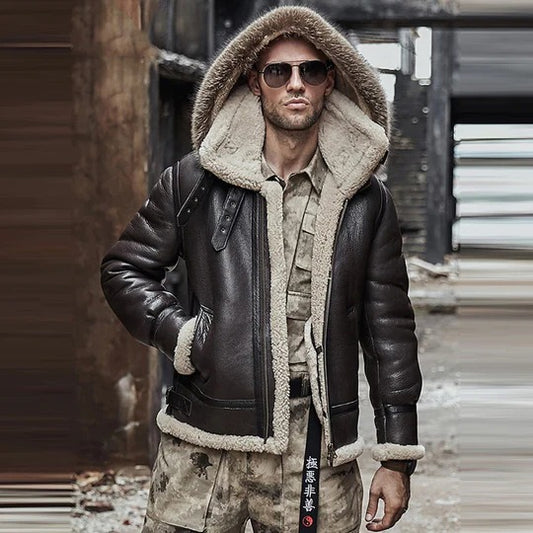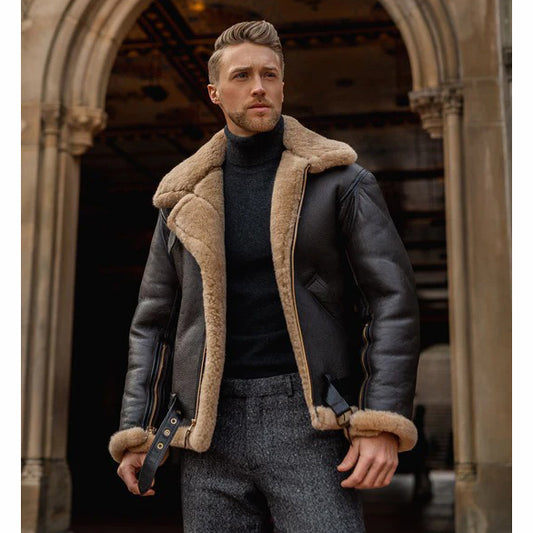Aviator jackets have long been a symbol of adventure, style, and ruggedness. Originally designed for pilots, these jackets have evolved into a timeless fashion staple that continues to captivate people across the globe. In this comprehensive guide, we'll explore the history, design, and various styles of aviator jackets, helping you make an informed decision on which one to add to your wardrobe. Whether you're a history enthusiast or a fashion aficionado, this blog post is tailored to provide valuable insights into the realm of aviator jackets.
The History of Aviator Jackets
Origins in Aviation
The aviator jacket, also known as the bomber jacket, traces its origins back to World War I. Designed for pilots to withstand the cold temperatures at high altitudes, these jackets were made from durable materials such as leather and wool. Their primary purpose was to keep pilots warm in the unheated cockpits of early aircraft.
Evolution Through the Decades
- World War I Era: The original aviator jackets were crafted from heavy leather with fur linings, designed to offer maximum insulation.
- World War II Era: The design was refined, incorporating features like ribbed cuffs and waistbands to improve fit and comfort.
- Post-War Era: Aviator jackets transitioned from military gear to a fashion statement, embraced by various subcultures and celebrities.
Key Features of Aviator Jackets
Materials and Construction
Aviator jackets are renowned for their high-quality materials and construction. Here are some key features:
- Leather: Most aviator jackets are made from genuine leather, providing durability and a classic look.
- Fur Lining: Traditionally, these jackets are lined with sheepskin or faux fur for added warmth.
- Design Elements: Look for features like zippered pockets, adjustable cuffs, and rugged stitching.
Style Variations
- Classic Bomber: Characterized by a simple, streamlined design with a zip front and ribbed cuffs.
- Flight Jacket: Often includes additional pockets and a more military-inspired look.
- B3 Bomber: A heavier, more insulated version with a thick fur lining.
How to Choose the Perfect Aviator Jacket
Consider Your Needs
- Climate: For colder climates, opt for a jacket with a thick fur lining. For milder weather, a lighter option may suffice.
- Style: Decide whether you prefer a classic look or a more modern twist. The choice of color and additional features can greatly influence the jacket's appearance.
Fit and Comfort
- Size: Ensure the jacket fits well across the shoulders and chest. It should be snug but not restrictive.
- Layering: Consider how much layering you intend to do. A slightly larger size might be necessary if you plan to wear bulky sweaters underneath.
Maintaining Your Aviator Jacket
Cleaning and Care
- Leather Jackets: Clean with a damp cloth and condition periodically to keep the leather supple. Avoid using harsh chemicals.
- Fur Linings: Spot clean with a gentle brush or take to a professional cleaner for more extensive maintenance.
Storage
- Hang Properly: Store your aviator jacket on a wide hanger to maintain its shape.
- Avoid Moisture: Keep the jacket in a dry place to prevent mildew and damage.
Comparisons: Aviator Jackets vs. Other Styles
| Feature | Aviator Jacket | Leather Bomber Jacket | Flight Jacket |
|---|---|---|---|
| Material | Leather & Fur | Leather | Leather & Synthetic |
| Insulation | High | Medium | Varies |
| Design | Classic & Military | Casual | Military-Inspired |
| Ideal For | Cold Weather | Mild to Cold Weather | Various Conditions |
Expert Opinions
Fashion Experts Weigh In
According to fashion historian Dr. Emily Carter, "The aviator leather jacket is a versatile piece that has stood the test of time due to its practical origins and stylish design. Its continued popularity speaks to its timeless appeal."
Style Guides
For modern styling tips, fashion blogger Jack Miller suggests, "Pair your aviator jacket with jeans and a simple tee for a casual look, or layer it over a button-up shirt for a more polished appearance."
FAQs
What are aviator jackets made of?
Aviator jackets are typically made from leather with a fur lining for insulation. Some modern versions use synthetic materials.
How should an aviator jacket fit?
The jacket should fit snugly across the shoulders and chest while allowing room for layering. It should not be overly tight.
Can I wear an aviator jacket in mild weather?
Yes, lighter aviator jackets can be suitable for milder weather. Choose a jacket with less insulation if you live in a warmer climate.
How do I clean my aviator jacket?
Leather jackets should be cleaned with a damp cloth and conditioned regularly. Fur linings may require spot cleaning or professional cleaning.
What is the difference between a bomber jacket and an aviator jacket?
While both terms are often used interchangeably, bomber jackets typically refer to a more general style, whereas aviator jackets specifically refer to those with military origins.
Conclusion
Aviator jackets are more than just a fashion statement; they represent a rich history and practical design that continues to appeal to people around the world. Whether you're drawn to their military heritage or their stylish versatility, an aviator jacket is a valuable addition to any wardrobe. By understanding their history, features, and how to care for them, you can make an informed decision and enjoy this classic piece for years to come.




